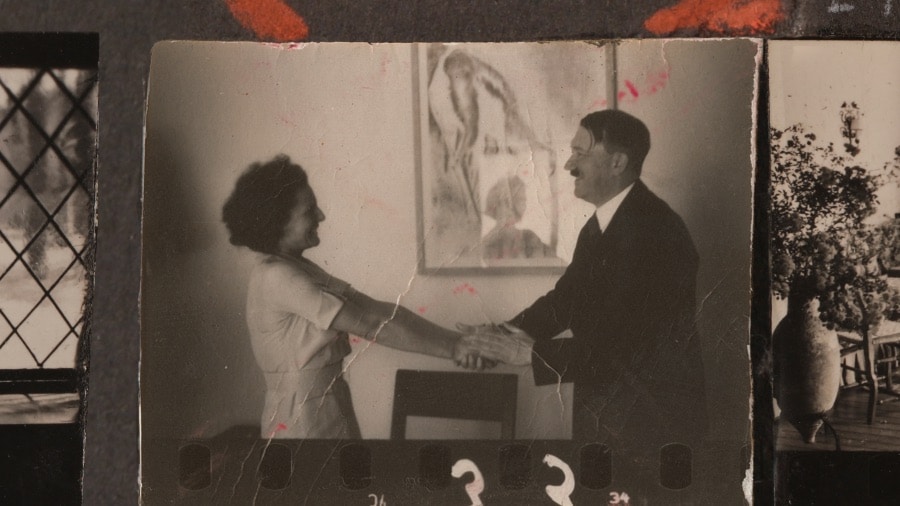




Dir: Andres Veiel | Germany Doc 115′
The Holocaust is once again revisited in this new documentary about the German filmmaker Leni Riefenstahl (1902-2003), one of the 20th century’s most controversial women filmmakers (along with Liliana Cavani).
Simply called Riefenstahl it focuses on her relationship with Hitler, Goebbels and Himmler rather than her artistic output and technical skills and the image she had created for herself in post war Germany, as seen in the 1993 documentary The Wonderful, Horrible Life of Leni Riefenstahl .
When Germans became mesmerised by the power of Hitler to make their country great again after the mass destruction of the First World War, Leni Riefenstahl was one of them. She remained a true believer in the party throughout her career and, according to seasoned documentarian Andreas Veiel (Bueys), may have contributed to at least one mass slaughter of Jews.
Andres Veiel (Beuys) uses evidence that has recently come to light in debunking Riefenstahl’s claim to be merely ‘a naive artist taken over by events’ during Hitler’s regime that provided much finance and commissioned her propagandist films (as it did for other creatives, such as the architect Albert Speer).
Veiel further claims Riefenstahl may have played a part in the September 1939 massacre of Polish Jews in Konskie during the German invasion of Poland when she was making a film commissioned by Hitler. Twenty two Polish were killed in the village but Riefenstahl later stated that her order to “get rid of the Jews’ simply referred to an instruction to move them off the set during filming.
Packed with fascinating insight and archive footage of Riefenstahl’s personal life and her interactions with key Nazis (only made public after the death of her husband in 2016), Riefenstahl also contains an interview from her 100th birthday, where she states that The Blue Light (1932) was her favourite film. The impressive film pictures the lissome director and actor scaling a rock face in search of the mysterious blue light that purportedly only appeared at full moon. The Blue Light was part of the Berg or Mountain films sub-genre popular at the time.
So quite apart from her talent as a filmmaker, Riefenstahl was clearly a feisty go-getter whose physical allure attracted the likes of Hitler who considered her an ideal example of Aryan womanhood. Riefenstahl herself describes rejecting the amorous advances of many a Nazi figure, and tells how Goebbels became obsessed with her. The Hungarian writer Krisztian Nyary also suggests she became close to her co-director Bela Balazs while they were working on The Blue Light. So clearly Riefenstahl was a vivacious woman who inflamed the curiosity – and potentially the envy – of both men and women. In this way any negative claim is more likely to stick to her in the era of ‘fake news’ where the past is being debated and re-examined with fresh, critical and often sceptical standpoint. In response to this Riefenstahl, simply states “I filmed the truth as it was then. Nothing more.”
Indeed Riefenstahl was fascinated by the human body and its potential for athleticism that translated into the ‘rhythm and movement’ style that was idiosyncratic of her sporting films such as Triumph and Olympia. Archive footage sees her visiting Africa’s Nuba tribe famous for their physical prowess in her early seventies where she honed her skills as a photographer and made the 1973 film The Last of the Nuba on location. Although the Nuba were clearly not blond and blue-eyed Aryans this all carries forward the Nazi ideal of peak fitness in the ideal of eradicating human deformities of all kinds to create a perfect race of Germans. But without naturally killing people isn’t this an ideal we should all be pursuing in an age where the health services are overburdened by the grossly obese?.
2025 marks the 70th anniversary of the end of the Second World War so films like this that question and re-examine the past and the role of propaganda on the international stage are once again becoming particularly relevant but we should also consider the past carefully and not try to view it merely from an uniquely 21st century perspective.
RIEFENSTAHL is released in UK & Irish cinemas 9th May 2025